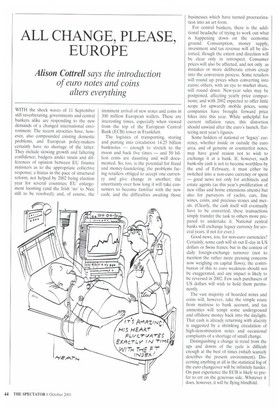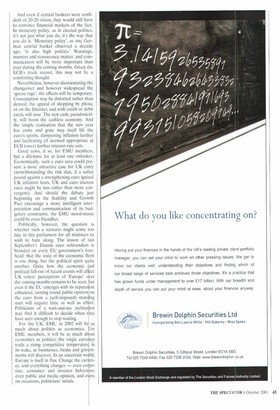ALL CHANGE, PLEASE, EUROPE
Alison Cottrell says the introduction
of euro notes and coins alters everything
WITH the shock waves of 11 September still reverberating, governments and central bankers alike are responding to the new demands of a changed international environment. The recent atrocities have, however, also compounded existing domestic problems, and European policy-makers certainly have no shortage of the latter. They include slowing growth and faltering confidence; budgets under strain and differences of opinion between EU finance ministers as to the appropriate collective response; a hiatus in the pace of structural reform, not helped by 2002 being election year for several countries; EU enlargement looming (and the Irish 'no' to Nice still to be resolved); and, of course, the
imminent arrival of new notes and coins in 300 million European wallets. These are interesting times, especially when viewed from the top of the European Central Bank (ECB) tower in Frankfurt.
The logistics of transporting, storing and putting into circulation 14.25 billion banknotes — enough to stretch to the moon and back five times — and 50 billion coins are daunting and well documented. So, too, is the potential for fraud and money-laundering; the problems facing retailers obliged to accept one currency and give change in another; the uncertainty over how long it will take consumers to become familiar with the new cash; and the difficulties awaiting those businesses which have turned procrastination into an art form.
For central bankers, there is the additional headache of trying to work out what is happening down on the economic ground. Consumption, money supply, investment and tax revenue will all be distorted, though the extent and direction will be clear only in retrospect. Consumer prices will also be affected, and not only as mistakes or more deliberate errors creep into the conversion process. Some retailers will round up prices when converting into euros; others, with an eye to market share, will round down. New-year sales may be postponed, affecting yearly price comparisons; and with 2002 expected to offer little scope for upwardly mobile prices, some companies have brought forward price hikes into this year. While unhelpful for current inflation rates, this distortion should unwind after the euro's launch, flattering next year's figures.
Some holders of national or 'legacy' currency, whether inside or outside the euro area, and of genuine or counterfeit notes, may have good reason not to wish to exchange it at a bank. If, however, such bank-shy cash is not to become worthless by the end of February, it must either be switched into a non-euro currency or spent — good news not only for architects and estate agents (as this year's proliferation of new villas and home extensions attests) but also for purveyors of yachts, cars, fine wines, coins, and precious stones and metals. (Clearly, the cash itself will eventually have to be converted; these transactions simply transfer the task to others more prepared to undertake it. National central banks will exchange legacy currency for several years, if not for ever.) Good news, too, for non-euro currencies? Certainly, some cash will sit out E-day in US dollars or Swiss francs; but in the context of daily foreign-exchange turnover (not to mention the rather more pressing concerns now weighing on capital flows), the contribution of this to euro weakness should not be exaggerated, and any impact is likely to be reversed in 2002. Few such purchasers of US dollars will wish to hold them permanently.
The vast majority of hoarded notes and coins will, however, take the simple route from mattress to bank account, and tax amnesties will tempt some underground and offshore money back into the daylight. That cash is already returning with alacrity is suggested by a shrinking circulation of high-denomination notes and occasional complaints of a shortage of small change.
Distinguishing a change in trend from the ups and downs of the cycle is difficult enough at the best of times (which scarcely describes the present environment). Discerning anything at all in the statistical fog of the euro changeover will be infinitely harder. On past experience the ECB is likely to prefer to err on the generous side. Whatever it does, however, it will be flying blindfold. And even if central bankers were confident of 20-20 vision, they would still have to convince financial markets of the fact. In monetary policy, as in elected politics, it's not just what you do, it's the way that you do it. 'Monetary policy', as one German central banker observed a decade ago, 'is also high politics.' Warnings, nuances and reassurance matter, and communication will be more important than ever during the coming months. Given the ECB's track record, this may not be a comforting thought.
Nevertheless, however disorientating the changeover and however widespread the 'queue rage', the effects will be temporary. Consumption may be distorted rather than dented; the appeal of shopping by phone or on the Internet, and with credit or debit cards, will soar. The new cash, paradoxically, will boost the cashless economy. And the simple realisation that the new year has come and gone may itself lift the euro's spirits, dampening inflation further and facilitating (if deemed appropriate at ECB tower) further interest-rate cuts.
Good news, if so, for EMU members, but a dilemma for at least one onlooker. Economically, such a euro area could present a more attractive case for UK entry (notwithstanding the risk that, if a softer pound against a strengthening euro ignited UK inflation fears, UK and euro interest rates might be less rather than more convergent). And should the debate just beginning on the Stability and Growth Pact encourage a more intelligent interpretation and communication of its budgetary constraints, the EMU mood-music could be even friendlier.
Politically, however, the question is whether such a scenario might come too late in this parliament for all ministers to wish to hum along. The lesson of last September's Danish euro referendum is branded on every EU government's forehead: that the state of the economic flesh is one thing, but the political spirit q ite another. Quite how the economic nd political fall-out of recent events will af ct UK voters' perceptions of 'Europe' o er the coming months remains to be seen; iut even if the EU emerges with its reputat on enhanced, turning round public opinion on the euro from a (self-imposed) stanaing start will require time as well as eff rt. Politicians of a wait-and-see inclina on may find it difficult to decide when t ey have seen enough to stop waiting.
For the UK, EMU in 2002 will be as much about politics as economics. or EMU members, it will be as much ab ut economics as politics: the single curre cy trails a rising competitive temperatur in its wake, as businesses, banks and gov rnments will discover. In an uncertain wo Id. Europe is itself in flux. Change the cur ency, and everything changes — even cos orate, consumer and investor behaviiur, even public and media opinion, and e en, on occasions, politicians' minds.



































































































 Previous page
Previous page